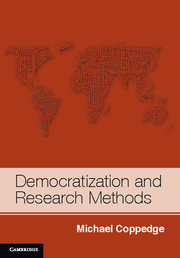Democratization and Research Methods Strategies for Social Inquiry Series
Langue : Anglais
Auteur : Coppedge Michael

Democratization and Research Methods summarizes what researchers know about why countries become and remain democracies, and why they often do not.
Democratization and Research Methods is a coherent survey and critique of both democratization research and the methodology of comparative politics. The two themes enhance each other: the democratization literature illustrates the advantages and disadvantages of various methodological approaches, and the critique of methods makes sense of the vast and bewildering democratization field. Michael Coppedge argues that each of the three main approaches in comparative politics - case studies and comparative histories, formal modeling and large-sample statistical analysis - accomplishes one fundamental research goal relatively well: 'thickness', integration and generalization, respectively. Throughout the book, comprehensive surveys of democratization research demonstrate that each approach accomplishes one of these goals well but the other two poorly. Chapters cover conceptualization and measurement, case studies and comparative histories, formal models and theories, political culture and survey research, and quantitative testing. The final chapter summarizes the state of knowledge about democratization and lays out an agenda for multi-method research.
1. Research methods and democratization; 2. Defining and measuring democracy; 3. Criteria for evaluating causal theories; 4. Checklists, frameworks, and Boolean analysis; 5. Case studies and comparative history; 6. Formal models and theories; 7. Rigor in extensive and intensive testing; 8. Political culture and survey research; 9. Quantitative testing; 10. An agenda for future research.
Michael Coppedge is Professor of Political Science at the University of Notre Dame. He is one of the principal investigators for the Varieties of Democracy Project at the Kellogg Institute, a collaboration producing many new indicators of democracy. He chaired the American Political Science Association's Task Force on Indicators of Democracy and Governance. His first book, Strong Parties and Lame Ducks: Presidential Partyarchy and Factionalism in Venezuela, analyzes institutional problems underlying the crisis of Venezuelan democracy. He has published articles on comparative and Latin American politics in the Journal of Politics, Perspectives on Politics, Comparative Politics, Comparative Political Studies, the Journal of Democracy, Party Politics, Studies in Comparative International Development and other journals and books. He is a past recipient of grants from Fulbright-Hayes, the Tinker Foundation, the World Society Foundation and the Research Council of Norway, and he has taught at Johns Hopkins School of Advanced International Studies, Princeton University, Yale University, and Georgetown University. Coppedge received his PhD from Yale University in 1988.
Date de parution : 06-2012
Ouvrage de 376 p.
18x25.4 cm
Disponible chez l'éditeur (délai d'approvisionnement : 14 jours).
Prix indicatif 63,72 €
Ajouter au panierDate de parution : 06-2012
Ouvrage de 376 p.
17.5x24.7 cm
Thème de Democratization and Research Methods :
© 2024 LAVOISIER S.A.S.



